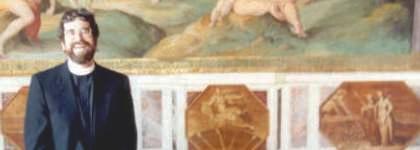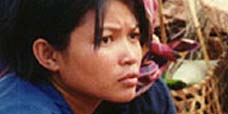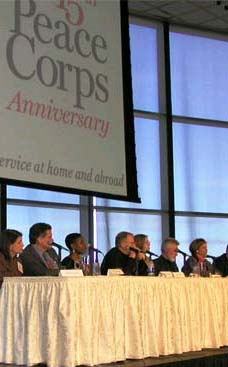2006.04.12: April 12, 2006: Headlines: COS - Kenya: Vatican: Religion: Catholicism: Astronomy: Science: Batesville Daily Guard: Kenya RPCV Guy Consolmagno says the space within the human soul where religion and science overlap is inhabited by poetry and metaphor
Peace Corps Online:
Peace Corps News:
Peace Corps Library:
Astronomy :
2006.04.12: April 12, 2006: Headlines: COS - Kenya: Vatican: Religion: Catholicism: Astronomy: Science: Batesville Daily Guard: Kenya RPCV Guy Consolmagno says the space within the human soul where religion and science overlap is inhabited by poetry and metaphor
Kenya RPCV Guy Consolmagno says the space within the human soul where religion and science overlap is inhabited by poetry and metaphor

Even the most calculating scientist entered the field through the doorway of a heart filled with passion for the work, whether he believes in a supreme creator. And that passion can lead right to the feet of Almighty God, Consolmagno said. "What gets you up in the morning and into the lab?” he asked. “Day to day, what motivates you? It’s love for what you’re doing, and wherever you find that love, you’ll find God. That’s where you’ll find your religion.” Guy Consolmagno is an an astronomer for the Vatican.
Kenya RPCV Guy Consolmagno says the space within the human soul where religion and science overlap is inhabited by poetry and metaphor
Guy Consolmagno speaks at Nucor Auditorium as part of the College’s Convocation series
By Wil Shane, Lyon College News Bureau
Published Tuesday April 11, 2006
The deep and silent space within the human soul where religion and science overlap is inhabited by poetry and metaphor, and God is there waiting to share His secrets, an astronomer for the Vatican said Thursday at Lyon College.
Dr. Guy Consolmagno, Society of Jesus, of the Vatican Observatory, presented his lecture “Astronomy, God, and the Search for Elegance” in Nucor Auditorium as part of the College’s Convocation series.
“Science and religion overlap in one place,” he told the capacity crowd. “In the human being doing the science, believing in the religion.”
Consolmagno is an astronomer at the Vatican Observatory, and his research includes observing the colors of trans-Neptunian Objects at the Vatican Observatory’s Advanced Technology Telescope. He’s also president of the International Astronomical Union Commission 16, Planets and Satellites, and a member of the IAU Working Group on Defining a Planet. He also serves as curator of the Vatican Meteorite collection, one of the largest in the world. His research explores the connections between meteorites and asteroids, and the origin and evolution of small bodies in the solar system.
He also served as keynote speaker for the 90th meeting of the Arkansas Academy of Science, which ran April 7-8 at the Lyon campus in Batesville. He was born in Detroit and earned master’s and doctorate degrees from MIT before joining the Peace Corps in the mid-1980s. He spent two years in Kenya before joining the Jesuits in 1989.
Both science and religion require their practitioners to live by three articles of “faith,” Consolmagno said.
“First, you have to believe the universe exists, and that you’re not just a butterfly who thinks he’s a scientist,” he said. “And second, you have to assume there are laws to be discovered and that the universe makes sense.”
The third requirement is also the most important, he added.
“You must believe that science is worth doing,” Consolmagno said. “That’s the biggest question of all.”
One must be careful not to substitute science for religion, or vice versa.
“Textbooks go out of date,” he said. “But the Bible doesn’t. It’s a different kind of book.”
Even the most calculating scientist entered the field through the doorway of a heart filled with passion for the work, whether he believes in a supreme creator. And that passion can lead right to the feet of Almighty God, Consolmagno said.
“What gets you up in the morning and into the lab?” he asked. “Day to day, what motivates you? It’s love for what you’re doing, and wherever you find that love, you’ll find God. That’s where you’ll find your religion.”
Those overlaps within the human heart are why different scientists analyzing exactly the same data can come to vastly different conclusions.
“Scientists are human beings who make choices based on their own perspectives and experiences,” Consolmagno said. “All are accurate, and all are different. People bring different ideas to the equation.”
Science doesn’t actually “prove” anything. It merely “describes,” he said.
“When someone says something has been proven scientifically, all that’s been proven is that the person doesn’t know what science is,” he said. “There are big differences between information, understanding and wisdom.”
Scientific theories must do more than merely satisfy the data. They must do so in a way that is “elegant.”
For example, when Einstein once heard that a rival scientist had completed experiments that disproved much of his Theory of Relativity, the renowned genius simply said, “He must be wrong,” Consolmagno said.
“Einstein held his theory was true because it was so elegant, it fit together so well, that it had to be true,” he said.
Science is not “literal,” Consolmagno said. It’s “poetry and metaphor” for how the universe works.
“The same God who came to save you, an individual, created individual molecules, atoms and electrons,” Consolmagno said. “When I’m doing science, I’m playing with God.”
When this story was posted in April 2006, this was on the front page of PCOL:





Peace Corps Online The Independent News Forum serving Returned Peace Corps Volunteers
 | The Peace Corps Library
The Peace Corps Library is now available online with over 40,000 index entries in 500 categories. Looking for a Returned Volunteer? Check our RPCV Directory. New: Sign up to receive PCOL Magazine, our free Monthly Magazine by email. Like to keep up with Peace Corps news as it happens? Sign up to recieve a daily summary of Peace Corps stories from around the world. |
 | PCOL readership increases 100%
Monthly readership on "Peace Corps Online" has increased in the past twelve months to 350,000 visitors - over eleven thousand every day - a 100% increase since this time last year. Thanks again, RPCVs and Friends of the Peace Corps, for making PCOL your source of information for the Peace Corps community. And thanks for supporting the Peace Corps Library and History of the Peace Corps. Stay tuned, the best is yet to come. |
 | History of the Peace Corps
PCOL is proud to announce that Phase One of the "History of the Peace Corps" is now available online. This installment includes over 5,000 pages of primary source documents from the archives of the Peace Corps including every issue of "Peace Corps News," "Peace Corps Times," "Peace Corps Volunteer," "Action Update," and every annual report of the Peace Corps to Congress since 1961. "Ask Not" is an ongoing project. Read how you can help. |
 | PC announces new program in Cambodia
Director Vasquez and Cambodia's Deputy Chief of Mission Meng Eang Nay announced a historic new partnership between the Peace Corps and the Kingdom of Cambodia that will bring volunteers to this Southeast Asian country for the first time. Under King Norodom Sihamoni and Prime Minister Hun Sen, Cambodia has welcomed new partnerships with the U.S. government and other U.S. organizations. |
 | Peace Corps suspends program in Bangladesh
Peace Corps Director Gaddi H. Vasquez announced the suspension of the Peace Corps program in Bangladesh on March 15. The safety and security of volunteers is the number one priority of the Peace Corps. Therefore, all Peace Corps volunteers serving in Bangladesh have safely left the country. More than 280 Peace Corps volunteers have served in Bangladesh since the program opened in November 1998. Latest: What other newspapers say. |
 | Invitee re-assigned after inflammatory remarks
The Peace Corps has pulled the invitation to Derek Volkart to join the Morocco Training Program and offered him a position in the Pacific instead after officials read an article in which he stated that his decision to join the Peace Corps was in "response to our current fascist government." RPCV Lew Nash says that "If Derek Volkart spoke his mind as freely in Morocco about the Moroccan monarchy it could cause major problems for himself and other Peace Corps volunteers." Latest: Volkart reverses stance, takes new assignment in Paraguay. |
 | March 1, 1961: Keeping Kennedy's Promise
On March 1, 1961, President John F. Kennedy issues Executive Order #10924, establishing the Peace Corps as a new agency: "Life in the Peace Corps will not be easy. There will be no salary and allowances will be at a level sufficient only to maintain health and meet basic needs. Men and women will be expected to work and live alongside the nationals of the country in which they are stationed--doing the same work, eating the same food, talking the same language. But if the life will not be easy, it will be rich and satisfying. For every young American who participates in the Peace Corps--who works in a foreign land--will know that he or she is sharing in the great common task of bringing to man that decent way of life which is the foundation of freedom and a condition of peace. " |
 | Paid Vacations in the Third World?
Retired diplomat Peter Rice has written a letter to the Wall Street Journal stating that Peace Corps "is really just a U.S. government program for paid vacations in the Third World." Director Vasquez has responded that "the small stipend volunteers receive during their two years of service is more than returned in the understanding fostered in communities throughout the world and here at home." What do RPCVs think? |
 | RPCV admits to abuse while in Peace Corps
Timothy Ronald Obert has pleaded guilty to sexually abusing a minor in Costa Rica while serving there as a Peace Corps volunteer. "The Peace Corps has a zero tolerance policy for misconduct that violates the law or standards of conduct established by the Peace Corps," said Peace Corps Director Gaddi H. Vasquez. Could inadequate screening have been partly to blame? Mr. Obert's resume, which he had submitted to the Peace Corps in support of his application to become a Peace Corps Volunteer, showed that he had repeatedly sought and obtained positions working with underprivileged children. Read what RPCVs have to say about this case. |
 | Why blurring the lines puts PCVs in danger
When the National Call to Service legislation was amended to include Peace Corps in December of 2002, this country had not yet invaded Iraq and was not in prolonged military engagement in the Middle East, as it is now. Read the story of how one volunteer spent three years in captivity from 1976 to 1980 as the hostage of a insurrection group in Colombia in Joanne Marie Roll's op-ed on why this legislation may put soldier/PCVs in the same kind of danger. Latest: Read the ongoing dialog on the subject. |
 | Friends of the Peace Corps 170,000 strong
170,000 is a very special number for the RPCV community - it's the number of Volunteers who have served in the Peace Corps since 1961. It's also a number that is very special to us because March is the first month since our founding in January, 2001 that our readership has exceeded 170,000. And while we know that not everyone who comes to this site is an RPCV, they are all "Friends of the Peace Corps." Thanks everybody for making PCOL your source of news for the Returned Volunteer community. |
Read the stories and leave your comments.

Some postings on Peace Corps Online are provided to the individual members of this group without permission of the copyright owner for the non-profit purposes of criticism, comment, education, scholarship, and research under the "Fair Use" provisions of U.S. Government copyright laws and they may not be distributed further without permission of the copyright owner. Peace Corps Online does not vouch for the accuracy of the content of the postings, which is the sole responsibility of the copyright holder.
Story Source: Batesville Daily Guard
This story has been posted in the following forums: : Headlines; COS - Kenya; Vatican; Religion; Catholicism; Astronomy; Science
PCOL32433
44



















